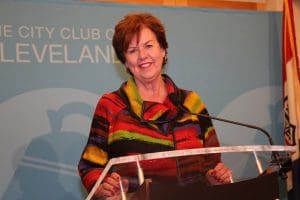2Gen Approach to Literacy, March 2018

Sharon Darling, NCFL
The Literacy Cooperative, with generous support from PNC, was very pleased to have Sharon Darling, president and founder of the National Center for Families Learning (NCFL) to address the community at The City Club of Cleveland on Wednesday, March 7, 2018. This event was an extended celebration of Read Across America Day, observed on March 2nd.
Ms. Darling is a nationally recognized expert in family literacy who described a two-generational (2Gen) approach to literacy where child and care-giver are addressing their literacy needs together on an inter-generational pathway to education and independence. The NCFL works with local partners, shares innovative practices and resources, provides professional development, awards and funding, and advocates federal and state policies to sustain and expand family literacy and engagement services. We were honored to host Ms. Darling at this year’s luncheon.
In addition to her address at The City Club, Ms. Darling was interviewed by Wayne Dawson on Fox 8 News’ Morning Show with The Literacy Cooperative’s Bob Paponetti and appeared on 90.3’s radio program The Sound of Ideas with Dr. JaNice Marshall, The Literacy Cooperative Board Member and Assistant Vice-President of Access & Community Engagement for Cuyahoga Community College’s College Pathways Program. We were happy that Ms. Darling could share her message in a variety of venues. To see video clips of these interviews or to view photos from the luncheon, please click on the links.
A 2Gen approach embraces the entire family and encompasses more than just educational needs. It’s a blend of post-secondary education and employment pathways for adults and educational development and enrichment programs for children, combined with economic supports like access to housing, transportation, and financial literacy.
Likewise, physical health and mental health can be a component of the 2Gen approach since these have a major impact on a family’s ability to thrive, and are a critical factor in the well-being of children and their caregivers. Additionally, social capital is a key feature of the 2Gen approach. Social capital are relationships that empower and support a family. Contact with family and friends, participation in community and faith-based organizations or school and workplace relationships, as well as connection to case managers or career coaches can build a family’s social capital.
When education needs are addressed for adult and child simultaneously, with economic, health, and social supports integrated into the spectrum of services, families have better outcomes that are long- lasting.
There are different models of how to accomplish a 2Gen approach. Some have a primary focus on either the child or the adult, with additional services. Others have an integrated system or network. The challenge is for services to align, share data and evaluation tools, and to collaborate meaningfully so that families can advance themselves and realize their full potential.
There is an emerging body of research and findings that is available about the 2Gen approach. To learn more about it you can visit Aspen Institute’s Ascend Program and Annie E. Casey Foundation to access many of their resources.
